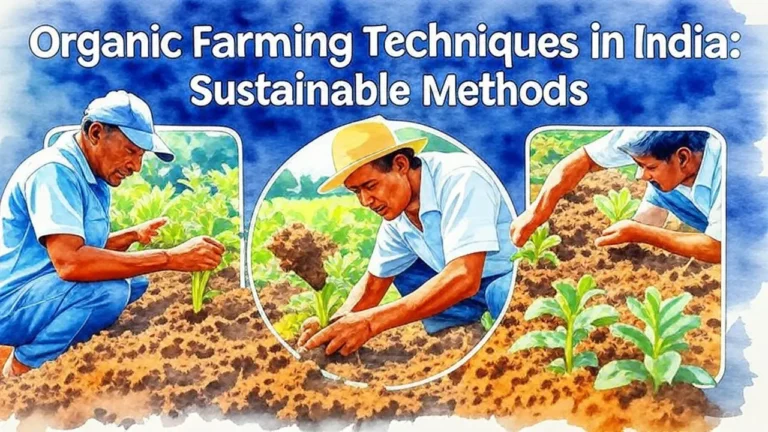In today’s fast-changing world, smart farming is key for growing crops well. This guide covers new methods and tech to help farmers grow more, use resources better, and face climate change.
It talks about using modern smart farming tools, new ways to manage soil, and green growing practices. These smart farming tips help farmers grow more, harm the environment less, and keep their farms going strong.

Key Takeaways
- Explore the role of smart farming technologies, such as IoT sensors and automated irrigation management, in optimizing crop cultivation.
- Understand the importance of effective soil management and preparation techniques for healthy plant growth.
- Learn about sustainable cultivation methods, including crop rotation, integrated pest management, and organic fertilization, to maximize yields and minimize environmental impact.
- Discover how precision farming technologies, such as GPS-guided equipment and drone applications, can enhance decision-making and resource efficiency.
- Gain insights into the integration of climate-smart agricultural practices to adapt to changing environmental conditions.
Understanding Modern Smart Farming Technologies
Smart farming technologies are changing agriculture. They help grow more crops and farm in a way that’s good for the planet. These new methods use data and automation to update old farming ways.
IoT Sensors and Data Collection Systems
IoT sensors are key in smart farming. They give farmers real-time info on soil, moisture, and weather. This info helps farmers make better choices and grow better crops.
Automated Irrigation Management
Automated irrigation is a big part of smart farming. It uses IoT sensors and smart algorithms to control water. This saves water and makes crops healthier and stronger.
Weather Monitoring Solutions
Knowing the weather is crucial in smart farming. Weather monitoring uses satellite data and AI to predict the weather. This helps farmers avoid bad weather and grow crops better.
These smart farming tools are changing agriculture. They make farming more sustainable, efficient, and based on data. As more farmers use these tools, the future of farming looks very promising.
| Smart Farming Technology | Key Benefits |
|---|---|
| IoT Sensors and Data Collection Systems | Provide real-time data on soil, moisture, and environmental conditions to optimize resource allocation and improve crop performance. |
| Automated Irrigation Management | Precisely monitor and regulate water distribution, ensuring efficient water usage and enhancing crop health. |
| Weather Monitoring Solutions | Enable farmers to anticipate climate patterns, mitigate weather-related risks, and make timely decisions for optimal crop cultivation. |
“Smart farming technologies are transforming the way we approach agriculture, leading to a more sustainable, efficient, and data-driven future.”
Soil Management and Preparation Techniques
Proper soil management is key to successful five essential tips for smart crop cultivation practices. Understanding and using effective soil preparation techniques is crucial. This helps farmers create a strong base for their crops to grow well.
This section covers the basics of soil management. It talks about how to improve nutrient levels, keep water in the soil, and grow crops sustainably.
Soil Testing and Analysis
The first step in good soil management is a thorough soil test. By checking the soil’s makeup, pH, and nutrients, farmers can spot any problems. This lets them make smart choices about five essential tips for smart crop cultivation practices, like using the right fertilizers or adjusting the soil’s pH.
Nutrient Management
It’s important to keep the soil’s nutrients balanced for plant health and five essential tips for smart crop cultivation practices. Farmers can use organic fertilization or cover crops to keep the soil rich. This way, they make sure their crops get what they need to grow well.
Conservation Tillage
Old tilling methods can harm the soil and reduce organic matter. Five essential tips for smart crop cultivation practices suggest using conservation tillage. This includes no-till or minimal-till farming. It keeps the soil intact, helps water soak in, and keeps good microbes in the soil. This leads to healthier soil and better five essential tips for smart crop cultivation practices.

Effective soil management is vital for five essential tips for smart crop cultivation practices. By using soil testing, managing nutrients, and adopting conservation tillage, farmers can build a strong base for their crops. This leads to successful farming and plenty of harvests in the long run.
Sustainable Crop Cultivation Methods for Maximum Yield
Farmers are now using climate-smart practices to grow more crops with less harm to the environment. They focus on crop rotation, integrated pest management, and organic fertilizers.
Crop Rotation Strategies
Crop rotation is an old but effective method. It keeps the soil healthy and productive. By changing crops, farmers avoid nutrient loss and pests.
This method also helps the soil itself. It makes the soil better without needing harmful chemicals.
Integrated Pest Management
Integrated pest management (IPM) uses many green ways to fight pests. It doesn’t just use chemicals. Instead, it uses natural methods and resistant crops.
This approach is better for the environment. It also makes farming more stable and strong.
Organic Fertilization Approaches
Organic fertilizers come from natural sources like compost and manure. They make the soil better and help plants grow. Using these fertilizers means less harm to the environment.
By choosing these methods, farmers can grow more while keeping the land healthy. This is good for both the crops and the planet.

| Sustainable Cultivation Method | Key Benefits |
|---|---|
| Crop Rotation | Improved soil health, disruption of pest and disease cycles, nutrient cycling |
| Integrated Pest Management | Reduced reliance on synthetic pesticides, enhanced ecosystem balance |
| Organic Fertilization | Increased soil fertility, improved water-holding capacity, support for beneficial microorganisms |
Precision Farming Technologies and Implementation
The way we farm is changing fast, thanks to new technologies. These tools help farmers work smarter, spend less, and grow more food. This leads to better crops and a healthier planet.
GPS-Guided Equipment
GPS-guided equipment is at the heart of precision farming. It lets farmers do their work with amazing accuracy. This means they use less resources, waste less, and save money.
Drone Technology Applications
Drones are changing farming with their advanced sensors and cameras. They give farmers key info on crops, soil, and pests. This info helps farmers make better choices and grow more food.
Variable Rate Technology
Variable rate technology (VRT) is key to precision farming. It lets farmers apply exactly what crops need, and where they need it. This way, they use less, harm the environment less, and grow more.
FAQ
What are the key benefits of implementing smart farming techniques?
Smart farming brings many advantages. It helps grow more crops, uses resources better, and is kinder to the environment. It also makes farms more profitable. By using new tech and green practices, farmers can work smarter and grow crops better.
How can IoT sensors and data collection systems enhance smart farming?
IoT sensors and data systems are key to smart farming. They let farmers check soil, weather, and plant health in real time. This helps farmers make better choices and automate tasks for better results.
What are the key soil management and preparation techniques for smart crop cultivation?
Good soil care is vital for smart farming. Farmers should test soil often, use the right nutrients, and use gentle tillage. These steps keep soil healthy, make nutrients available, and support green farming.
What are some examples of sustainable crop cultivation methods for maximum yield?
For high yields, farmers use smart crop rotation, manage pests well, and use organic fertilizers. These methods keep soil rich, fight pests, and ensure farming lasts long.
How can precision farming technologies improve crop management?
Technologies like GPS, drones, and variable rate systems boost crop care. They help farmers work more efficiently, save money, and use resources wisely. This leads to better crops and higher yields.
Shivank patyal is a versatile blogger with a B.Sc. in Plant Biotechnology and 5 years of experience writing about agriculture, sustainability, and entertainment topics. With expertise in digital marketing and field experience in crop cultivation, Shivank provides practical insights for farmers while also engaging readers with content on diverse subjects. Passionate about sharing knowledge, Shivank combines education and creativity to connect with a wide audience.





That was very helpful.
Thanks so much 🙂